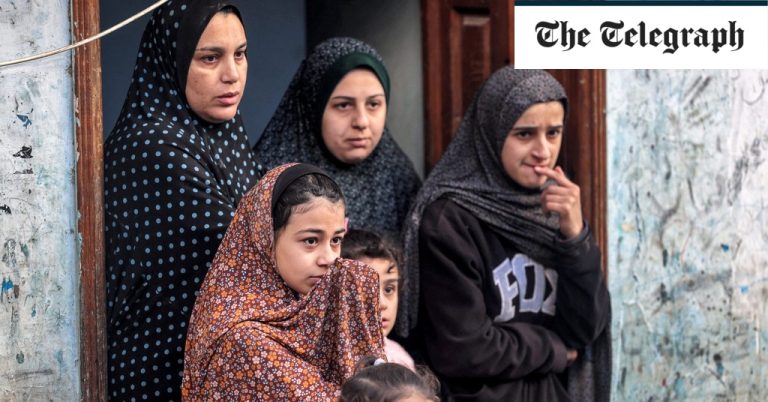The allegations come as Israeli authorities released an official report, the first of its kind, on the alleged “sadistic sex crimes” committed by Hamas militants against Israeli citizens on October 7, including mass rapes and the mutilation of women.
Published on Tuesday by the Association of Rape Crisis Centers in Israel and shared with the UN, the report analyses public and confidential testimonies, eyewitness accounts and interviews with victims and first responders.
The Telegraph understands the OHCHR’s own reports of sexual violence are based on accounts provided by Palestinian female detainees, as well as information obtained via human rights organisations that represent alleged victims.
The full details of the allegations – including the locations of the different human rights violations – have been outlined in a letter shared with the Israelis and other governments.
In line with OHCHR policy, the letter will be made publicly available after two months. This is expected to be in early April.
“We hope that governments that receive our letters also respond to the allegations contained and also take the action that is expected of them which is to put an end to these violations, carry out an independent and effective investigation, and hold those accountable,” said Ms Alaslem.
The Telegraph has not been able to independently verify the allegations.
Palestinian women ‘caged’ and ‘executed’
In its statement published on Monday, OHCHR also said female detainees had reportedly been “severely beaten” and denied sanitary products, food, and medicine.
“On at least one occasion, Palestinian women detained in Gaza were allegedly kept in a cage in the rain and cold,” OHCHR added.
There have been reports, too, of arbitrary executions of Palestinian women in Gaza as they were fleeing or seeking refuge, “often together with family members, including their children”.
According to the OHCHR experts, “some of them were reportedly holding white pieces of cloth when they were killed by the Israeli army or affiliated forces”.
Ms Alsalem said the thousands of Palestinians detained in Gaza since the beginning of the war, including women and girls, had been classified by Israel as “illegal combatants”.
For years, Palestinians have been arrested by Israeli authorities without formal charges, known as ‘administrative detention’, whereby suspects can be held for months – or even years – without trial.
These individuals have been held in facilities such as Ofer Prison, an Israeli incarceration centre located in the West Bank. The prison has been a subject of concern for decades due to documented cases of human rights violations, including instances of torture.
Reports of historic sexual violence against male Palestinian detainees by Israeli soldiers and prison officers have also been well-documented, including sexual harrasment, forced nudity, rape, and purposeful injury to genitalia.
Before October 7, approximately 1,300 Palestinians were held under administrative detention, but recent reports from human rights groups show that number has surged to more than 2,200.
Detainees are reportedly prevented from meeting their lawyers for up to 80 days, added Ms Alaslem.
On Tuesday, Matthew Miller, the spokesperson for the US State Department, acknowledged the recent allegations of sexual assault against Palestinian women by Israeli authorities, but said the US were unable to independently confirm the reports.
Last week, the US Congress condemned the alleged rape and mutilation of Israeli women by Hamas militants during the October 7 attacks, in which 1,200 people were killed.
In response to OHCHR’s statement, Israel’s mission to the UN in Geneva said it “forcefully rejects” the latest allegations as “despicable and unfounded claims”.
It added: “The State of Israel will continue to abide by its obligations under international law. No complaint has been received by Israeli authorities but Israel remains ready to investigate any concrete claims of misconduct by its security forces when presented with credible allegations and evidence.”
Protect yourself and your family by learning more about Global Health Security
